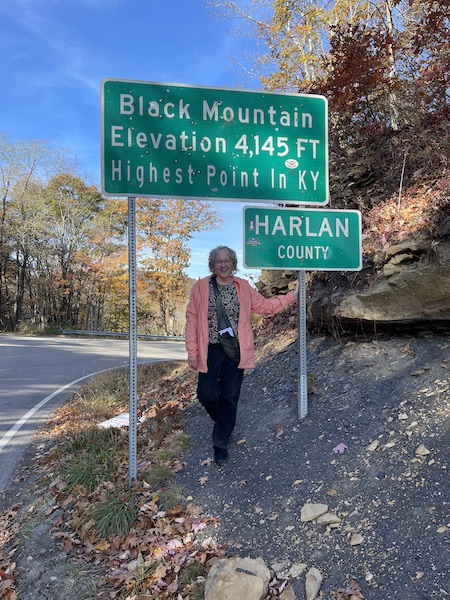I had factored in human greed and destruction, but I had not factored in the human goodness and systemic creativity that we met throughout the trip. I had not anticipated hope.

“Mountaintop removal coal mining? My heart can’t take it.” That thought kept me from going to Wise County, VA, with Faith and Money Network’s Trip of Perspective for several years.
In part, I was right. The extractive industry is a nightmare, blasting ancient mountaintops, fouling once-pure waterways, forever changing the stunning natural vistas, and fracturing long-established communities.
But I had only been right in part. I had factored in human greed and destruction, but I had not factored in the human goodness and systemic creativity that we met throughout the trip. I had not anticipated hope.
FMN’s hosts for this Trip of Perspective were members of SAMS, or Southern Appalachian Mountain Stewards, an aptly-named grassroots organization of people addressing the environmental and human costs of coal extraction.
“People of this region should have control over their future,” said Adam Malle, SAMS’ executive administrator. “We have been exploited for a century. We’ve never had an economy where we have our own power to decide.”
Started in 2007, SAMS is now led primarily by a small group of young adults. They are community organizers and educators, theological thinkers, college graduates, artists, archivists, and racial justice advocates who call out the coal companies’ degradation of miners and ecosystem and call in their neighbors.
As a Kentuckian, I confess my bias that Appalachia is as beautiful as any place on Earth. The Rockies may be dramatic, but they are geological teenagers compared to the Appalachian Mountains that are more than half a billion years old, existing long before dinosaurs and even before bones existed on land. Hundreds of millions of years of wear have reduced the Appalachian Mountains to their softer profile. But a coal company can take the top off of a mountain in less than a year, depending on its size and amount of coal.
SAMS faces deep challenges vital to the literal survival of their communities. It has to be dispiriting work at many levels, given the lack of regulations in Virginia and the political, i.e., financial, clout of the coal companies. Mountaintop removal coal mining continues. And yet SAMS members keep up their work, finding hope in one another, in their slowly accumulating wins, and in their connections to other regional groups fighting to protect this beautiful western corner of Virginia and its people.
SAMS is renovating an older home as a “movement hub,” a “center for lifting the burdens that people in movement work face,” Malle said. SAMS and other groups will share “physical space, partnership, and leadership building—the shared basic infrastructure for organizing,” he said. They are building a hub, not siloes of specifically focused work, said SAMS’ community organizer Jess Mullins Fullen. This is intersectionality in practice. (Christy Smith describes some of SAMS’ hub partners in her reflection on this Trip of Perspective.)
A majority of local citizens once considered SAMS to be an enemy of miners and the local economy—and the coal companies certainly portray SAMS in that light—but more people have come to see SAMS as an ally in the fight for miners’ physical and economic well-being. They have learned that SAMS is not about destroying the coal companies. It is about supporting their neighbors and being part of the network of people advocating for a better future that preserves the mountaintops, water, human health, and communities.
“We want to restructure our economy in a way that makes it possible for people to prosper without destroying the environment, our water, and our land,” Malle said. “We would like for coal miners that have been trapped in an industry that kills them to have alternatives that are at least on par [financially] with what they are doing now.”
Malle said the SAMS collective sees potential in renewable energy development, as well as forest farming for such non-timber products as goldenseal and ginseng. But he emphasized that SAMS’ primary concern is the area’s people.
“Regardless of what comes here or happens here,” Malle said, “[the important thing] is that it is done in partnership with the community rather than foisted upon us.”
“We want to see our region keeping the resources that create prosperity within our communities,” Malle said. “Our mountains are extracted for the profit of others. Our trees are logged for the profit of others. We want to maintain those resources here so our mountains can be a benefit and beauty for us. They are a treasure as they are.”
Susan Taylor | November 2022
Susan Taylor is the vice president of the Faith and Money Network board of directors, a writer and speaker, and a partner with Just Money Advisors.